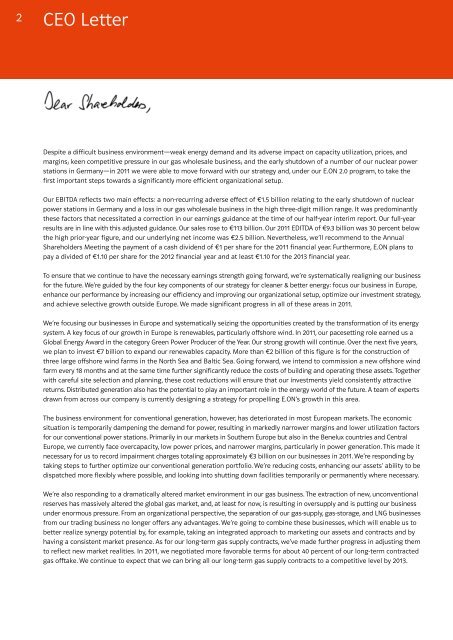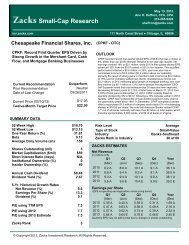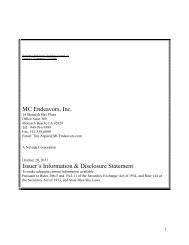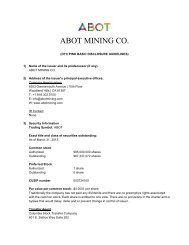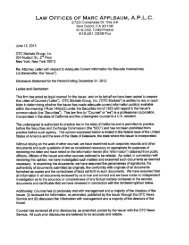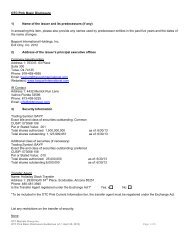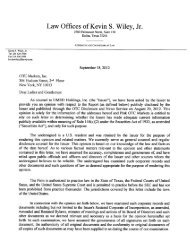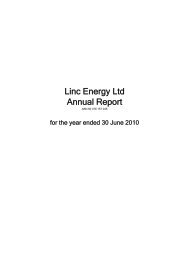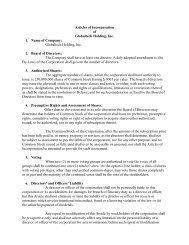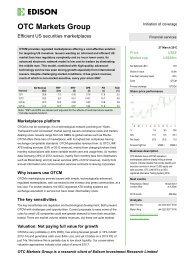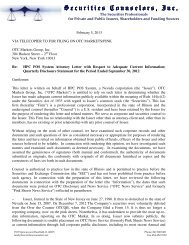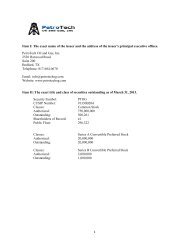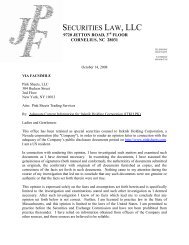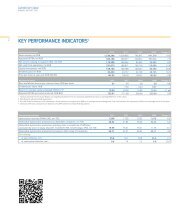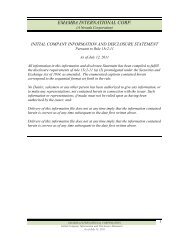2011 Annual Report - OTCIQ.com
2011 Annual Report - OTCIQ.com
2011 Annual Report - OTCIQ.com
You also want an ePaper? Increase the reach of your titles
YUMPU automatically turns print PDFs into web optimized ePapers that Google loves.
2<br />
CEO Letter<br />
Despite a difficult business environment—weak energy demand and its adverse impact on capacity utilization, prices, and<br />
margins; keen <strong>com</strong>petitive pressure in our gas wholesale business; and the early shutdown of a number of our nuclear power<br />
stations in Germany—in <strong>2011</strong> we were able to move forward with our strategy and, under our E.ON 2.0 program, to take the<br />
first important steps towards a significantly more efficient organizational setup.<br />
Our EBITDA reflects two main effects: a non-recurring adverse effect of €1.5 billion relating to the early shutdown of nuclear<br />
power stations in Germany and a loss in our gas wholesale business in the high three-digit million range. It was predominantly<br />
these factors that necessitated a correction in our earnings guidance at the time of our half-year interim report. Our full-year<br />
results are in line with this adjusted guidance. Our sales rose to €113 billion. Our <strong>2011</strong> EDITDA of €9.3 billion was 30 percent below<br />
the high prior-year figure, and our underlying net in<strong>com</strong>e was €2.5 billion. Nevertheless, we’ll re<strong>com</strong>mend to the <strong>Annual</strong><br />
Shareholders Meeting the payment of a cash dividend of €1 per share for the <strong>2011</strong> financial year. Furthermore, E.ON plans to<br />
pay a divided of €1.10 per share for the 2012 financial year and at least €1.10 for the 2013 financial year.<br />
To ensure that we continue to have the necessary earnings strength going forward, we’re systematically realigning our business<br />
for the future. We’re guided by the four key <strong>com</strong>ponents of our strategy for cleaner & better energy: focus our business in Europe,<br />
enhance our performance by increasing our efficiency and improving our organizational setup, optimize our investment strategy,<br />
and achieve selective growth outside Europe. We made significant progress in all of these areas in <strong>2011</strong>.<br />
We’re focusing our businesses in Europe and systematically seizing the opportunities created by the transformation of its energy<br />
system. A key focus of our growth in Europe is renewables, particularly offshore wind. In <strong>2011</strong>, our pacesetting role earned us a<br />
Global Energy Award in the category Green Power Producer of the Year. Our strong growth will continue. Over the next five years,<br />
we plan to invest €7 billion to expand our renewables capacity. More than €2 billion of this figure is for the construction of<br />
three large offshore wind farms in the North Sea and Baltic Sea. Going forward, we intend to <strong>com</strong>mission a new offshore wind<br />
farm every 18 months and at the same time further significantly reduce the costs of building and operating these assets. Together<br />
with careful site selection and planning, these cost reductions will ensure that our investments yield consistently attractive<br />
returns. Distributed generation also has the potential to play an important role in the energy world of the future. A team of experts<br />
drawn from across our <strong>com</strong>pany is currently designing a strategy for propelling E.ON’s growth in this area.<br />
The business environment for conventional generation, however, has deteriorated in most European markets. The economic<br />
situation is temporarily dampening the demand for power, resulting in markedly narrower margins and lower utilization factors<br />
for our conventional power stations. Primarily in our markets in Southern Europe but also in the Benelux countries and Central<br />
Europe, we currently face overcapacity, low power prices, and narrower margins, particularly in power generation. This made it<br />
necessary for us to record impairment charges totaling approximately €3 billion on our businesses in <strong>2011</strong>. We’re responding by<br />
taking steps to further optimize our conventional generation portfolio. We’re reducing costs, enhancing our assets’ ability to be<br />
dispatched more flexibly where possible, and looking into shutting down facilities temporarily or permanently where necessary.<br />
We’re also responding to a dramatically altered market environment in our gas business. The extraction of new, unconventional<br />
reserves has massively altered the global gas market, and, at least for now, is resulting in oversupply and is putting our business<br />
under enormous pressure. From an organizational perspective, the separation of our gas-supply, gas-storage, and LNG businesses<br />
from our trading business no longer offers any advantages. We’re going to <strong>com</strong>bine these businesses, which will enable us to<br />
better realize synergy potential by, for example, taking an integrated approach to marketing our assets and contracts and by<br />
having a consistent market presence. As for our long-term gas supply contracts, we’ve made further progress in adjusting them<br />
to reflect new market realities. In <strong>2011</strong>, we negotiated more favorable terms for about 40 percent of our long-term contracted<br />
gas offtake. We continue to expect that we can bring all our long-term gas supply contracts to a <strong>com</strong>petitive level by 2013.


